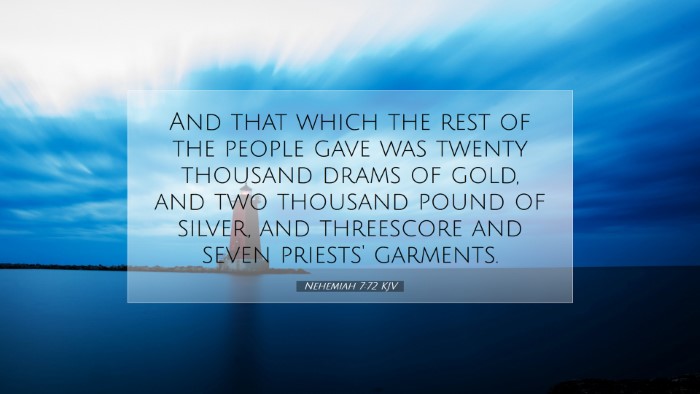Commentary on Nehemiah 7:72
Text of Nehemiah 7:72 (ESV): "And what the rest of the people gave was 20,000 darics of gold, and 2,200 minas of silver, and 67 priests' garments."
Introduction
Nehemiah 7:72 is a significant verse that encapsulates the communal commitment of the returned exiles to the rebuilding efforts in Jerusalem. This verse follows a detailed enumeration of the people who returned from exile and showcases the financial resources dedicated to the restoration of the temple and the reestablishment of worship in Jerusalem. The commentary seeks to explore theological, historical, and practical applications derived from this passage.
Theological Insights
From the theological perspective, Nehemiah 7:72 highlights crucial themes regarding community, stewardship, and worship.
- Community Participation: The mention of the collective contributions demonstrates how the exiles participated actively in God's work. Matthew Henry notes that the unity of purpose among the people resulted in substantial offerings that reflected their dedication to God’s requirements.
- Stewardship: The gifts were not insignificant. Albert Barnes emphasizes that the amount contributed (20,000 darics of gold and 2,200 minas of silver) indicates a conscientious stewardship upon the return from exile. This reflects the importance of using God-given resources to support the work of the Lord.
- The Importance of Worship: Adam Clarke elucidates on the priests' garments mentioned in this verse, indicating a restoration of proper worship. The garments were essential for the priests, highlighting that worship must be conducted with reverence and according to divine ordinances.
Historical Context
The historical setting of this verse is crucial to understanding its implications. After a long period of exile, the Israelites faced the daunting task of rebuilding their city and reforming their society. The considerable gifts reported in Nehemiah 7:72 signify not just a financial investment but a profound commitment to re-establishing the worship and civic order of their community.
Nehemiah’s leadership played a pivotal role in mobilizing the people. Commentary from Matthew Henry suggests that Nehemiah’s example inspired the exiles to give generously. They were reestablishing their identity as God's covenant community, and their contributions were an expression of faith in God's provisions.
Exegesis of the Text
Examining the specific terms used in Nehemiah 7:72 reveals layers of meaning that enrich our understanding:
- Darics and Minas: The specific mention of “darics” and “minas” indicates a measured and organized approach to the contributions, suggesting both value and intentionality in their giving.
- Priests' Garments: The reference to the “67 priests' garments” underlines the importance placed upon the priesthood within Israelite society. It reflects the readiness to restore and uphold the traditions of worship, resonating with the theological idea that proper worship requires both the heart of the people and the acceptable service of the priests.
Practical Applications
The implications of Nehemiah 7:72 extend beyond its historical context and lead us to reflective practices in our modern-day churches.
- Encouragement for Generosity: Just as the exiles gave of their wealth for the sake of God's work, modern believers are encouraged to evaluate their own stewardship. This can prompt congregations to support missions, local community projects, and church needs in a manner reflective of their commitment to God.
- Restoration of Worship: The attention given to the priests' garments encourages contemporary worship leaders and church bodies to consider the details and reverence that must accompany worship. It invites an examination of how worship attire, environment, and practices affect collective reverence towards God.
- Unity in Purpose: The collective action of giving in Nehemiah’s time serves as a reminder for today’s church to unite around common goals. It emphasizes the importance of collaboration in any visionary effort, be it building projects, community outreach, or spiritual renewal.
Conclusion
In summation, Nehemiah 7:72 is more than a record of contributions; it is a powerful testament to the faith, unity, and dedication of a community committing to God's work. As pastors, students, and scholars reflect on this passage, it provokes thoughtful consideration of how the church today can emulate such collective spirit in stewarding their resources for worship and God’s glory.


